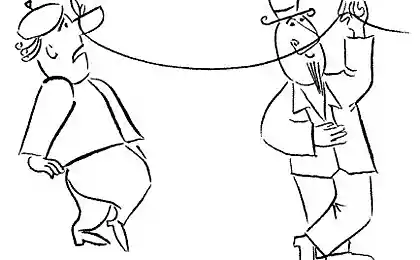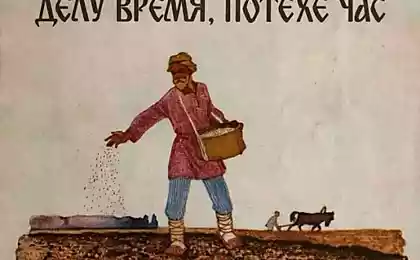536
"No brainer": the etymology known since childhood expressions
These expressions are familiar to us from childhood, but where did they come from? No brainer!"No-brainer" — this expression became famous thanks to the poem ("it is Clear even to a hedgehog — This Peter was a bourgeois"). It appeared in Soviet boarding schools for gifted children. They recruited adolescents who left school two years (classes A, B, C, D, e) or one year (classes E, F, I). Students one-year flood were called "hedgehogs". When they came to the orphanage, dukhovnyi was already ahead of them on a custom program, so at the beginning of the school year, the expression "no brainer" was very important.

To RUB the glassesIn the 19th century, the gamblers, the gamblers resorted to tricks: in the game with a special adhesive composition was applied to map the extra points (red or black marks) from a powder, and if necessary could erase those points. Hence the expression "RUB points", meaning a representation of something in a favorable light.
Whipping boy
Whipping boys in England and other European countries of the XV — XVIII centuries, called the boys who were brought together with princes and received corporal punishment for the faults of a Prince. The effectiveness of this method was better than direct whipping of the culprit, as the Prince had not had the opportunity to play with other children, except the boy, with whom he established a strong emotional connection.
On the nose
The nose is a diminutive of dialectal sissy ("shots") the name of a precise hit with an axe in the same place at the carpentry work. Today to refer to high precision used the expression "on the nose".
Hack to death on your noseBefore the nose called not only the face, but tag is worn and where you put the notches for accounting work, debts, etc. Due to this, there is an expression "commit".
In another sense the nose called the bribe, the offering. The expression "to remain with the nose" meant to go with the unmatched offering of not agreeing.
To play on the nervesAfter opening the doctors of antiquity nerves in the human body, they called them by similarity with the strings of musical instruments the same word — nervus. Hence arose the expression for the irritating action — "play on nerves".
Not at easeToday in the French language in everyday life, the word assiette "plate" means. But sooner, not later than the fourteenth century, it meant "landing of guests, their arrangement at the table, that is, near the plates". Then, with the expansion of the circle of relations, assiette was the "location of military camp" and then the city. In the XVII century the word had absorbed all the "specificity" possible "positions" and came to mean generally any "position"... In the same century assiette appeared and figurative sense — "state of mind".
Russian bar, speaking and even thinking in French, apparently, do not care about the accuracy of Russian language and another in the eighteenth century in his "translated" the French revolution: in Russian the idiom from the original language; instead of "provisions" were... "not my plate". Thanks to their negligence in the Russian language there is a beautiful figure of speech!
Pour on the first numberIn the old days, school students often flogged, sometimes even without any fault of offense. If the instructor showed a special zeal, and the student got particularly strong, it could be exempt from further defect in the current month, until the first day of the following month.
Orphan of KazanAfter the capture of Kazan Ivan the terrible, wanting to bind to a local aristocracy, which was voluntarily awarded him a high-ranking Tatars. Many of them to receive rich gifts, pretended to be much affected by the war. Hence the expression "the orphan Kazan".
Be a red threadOn the orders of the British Admiralty in 1776 in the production of ropes for the Navy they need to weave the red thread that it was impossible to remove even from a small piece of rope. Apparently, this measure was intended to reduce theft of cables. Hence the expression "to run like a Golden thread" on the main thoughts of the author throughout literary works and first it was used by Goethe's novel "elective affinity".

To give the nodIn the pre-revolutionary alphabet the letter D is called "good." The flag corresponding to that letter in the set of signals of the military-the Navy is set to "Yes, I agree, authorize". This was the cause of the expression "give good".
Roar BelugaSilent fish Beluga is irrelevant to the expression "to roar Beluga," which means loud and strong cry, cry. Before the Beluga was called not only fish, but also toothed whale, which is now known to us as the whale and you'll be a loud roar.
Blue bloodof the Spanish Royal family and the nobility were proud of the fact that, unlike ordinary people, they are descended from the West ready and never mingled with the Moors penetrated into Spain from Africa. Unlike the dark-skinned commoners, on the pale skin of the upper class stood out blue veins, and so they called themselves the sangre azul, which means "blue blood". Hence this expression to denote the aristocracy has penetrated into many European languages, including in Russian.
Walk to the handleIn Ancient Russia cakes baked in the shape of a padlock with a round shackle. Citizens often bought rolls and ate them on the street, holding the handle, or the handle. For reasons of hygiene handle itself in food not used, and gave it to the poor or thrown to be devoured by dogs.According to one version, about those who did not disdain to eat it, saying, got to handle. Today the expression "to reach hands" so not to fall, to lose human shape.
To spread the idea of the treeIn "the Word about Igor's regiment" can be found line: "Bojan prophetic, if someone wanted to sing, spread the mysiya of the tree, a gray wolf on the ground, a bluish eagle under the clouds." Translated from the ancient Russian "Mys" is protein. But because of the incorrect translation in some editions of "Words" appeared humorous expression "to spread the idea of the tree" that means to go into unnecessary details to distract from the main point.
The skeleton in the closet
"Skeleton in the closet" is an English expression meaning a specific concealed fact biography (personal, family, corporate, etc.), which in the case of its promulgation can cause significant damage to the reputation.

Appearance expressions connected with medicine. Doctors in Britain were not allowed to work with dead bodies to 1832. And the only bodies available for dissection for medical purposes, were the bodies of executed criminals. Although the execution of criminals was not uncommon in the UK XVIII century, it was unlikely that a particular doctor would be a lot of corpses for his working career. For this reason it was common practice for a doctor who had the good fortune to dissect the corpse of an executed criminal, to keep a skeleton for research purposes. Public opinion did not allow physicians to keep the skeletons in sight, so they had to keep them away from prying eyes. For this reason, many suspected that the doctors kept somewhere at the skeletons, and one such place could be a closet. published
P. S. And remember, just changing your mind — together we change the world! ©
Source: //izbrannoe.com/news/eto-interesno/ezhu-ponyatno-i-eshche-15-vyrazheniy-proiskhozhdeniya-kotorykh-vy-mogli-ne-znat/

To RUB the glassesIn the 19th century, the gamblers, the gamblers resorted to tricks: in the game with a special adhesive composition was applied to map the extra points (red or black marks) from a powder, and if necessary could erase those points. Hence the expression "RUB points", meaning a representation of something in a favorable light.
Whipping boy
Whipping boys in England and other European countries of the XV — XVIII centuries, called the boys who were brought together with princes and received corporal punishment for the faults of a Prince. The effectiveness of this method was better than direct whipping of the culprit, as the Prince had not had the opportunity to play with other children, except the boy, with whom he established a strong emotional connection.
On the nose
The nose is a diminutive of dialectal sissy ("shots") the name of a precise hit with an axe in the same place at the carpentry work. Today to refer to high precision used the expression "on the nose".
Hack to death on your noseBefore the nose called not only the face, but tag is worn and where you put the notches for accounting work, debts, etc. Due to this, there is an expression "commit".
In another sense the nose called the bribe, the offering. The expression "to remain with the nose" meant to go with the unmatched offering of not agreeing.
To play on the nervesAfter opening the doctors of antiquity nerves in the human body, they called them by similarity with the strings of musical instruments the same word — nervus. Hence arose the expression for the irritating action — "play on nerves".
Not at easeToday in the French language in everyday life, the word assiette "plate" means. But sooner, not later than the fourteenth century, it meant "landing of guests, their arrangement at the table, that is, near the plates". Then, with the expansion of the circle of relations, assiette was the "location of military camp" and then the city. In the XVII century the word had absorbed all the "specificity" possible "positions" and came to mean generally any "position"... In the same century assiette appeared and figurative sense — "state of mind".
Russian bar, speaking and even thinking in French, apparently, do not care about the accuracy of Russian language and another in the eighteenth century in his "translated" the French revolution: in Russian the idiom from the original language; instead of "provisions" were... "not my plate". Thanks to their negligence in the Russian language there is a beautiful figure of speech!
Pour on the first numberIn the old days, school students often flogged, sometimes even without any fault of offense. If the instructor showed a special zeal, and the student got particularly strong, it could be exempt from further defect in the current month, until the first day of the following month.
Orphan of KazanAfter the capture of Kazan Ivan the terrible, wanting to bind to a local aristocracy, which was voluntarily awarded him a high-ranking Tatars. Many of them to receive rich gifts, pretended to be much affected by the war. Hence the expression "the orphan Kazan".
Be a red threadOn the orders of the British Admiralty in 1776 in the production of ropes for the Navy they need to weave the red thread that it was impossible to remove even from a small piece of rope. Apparently, this measure was intended to reduce theft of cables. Hence the expression "to run like a Golden thread" on the main thoughts of the author throughout literary works and first it was used by Goethe's novel "elective affinity".

To give the nodIn the pre-revolutionary alphabet the letter D is called "good." The flag corresponding to that letter in the set of signals of the military-the Navy is set to "Yes, I agree, authorize". This was the cause of the expression "give good".
Roar BelugaSilent fish Beluga is irrelevant to the expression "to roar Beluga," which means loud and strong cry, cry. Before the Beluga was called not only fish, but also toothed whale, which is now known to us as the whale and you'll be a loud roar.
Blue bloodof the Spanish Royal family and the nobility were proud of the fact that, unlike ordinary people, they are descended from the West ready and never mingled with the Moors penetrated into Spain from Africa. Unlike the dark-skinned commoners, on the pale skin of the upper class stood out blue veins, and so they called themselves the sangre azul, which means "blue blood". Hence this expression to denote the aristocracy has penetrated into many European languages, including in Russian.
Walk to the handleIn Ancient Russia cakes baked in the shape of a padlock with a round shackle. Citizens often bought rolls and ate them on the street, holding the handle, or the handle. For reasons of hygiene handle itself in food not used, and gave it to the poor or thrown to be devoured by dogs.According to one version, about those who did not disdain to eat it, saying, got to handle. Today the expression "to reach hands" so not to fall, to lose human shape.
To spread the idea of the treeIn "the Word about Igor's regiment" can be found line: "Bojan prophetic, if someone wanted to sing, spread the mysiya of the tree, a gray wolf on the ground, a bluish eagle under the clouds." Translated from the ancient Russian "Mys" is protein. But because of the incorrect translation in some editions of "Words" appeared humorous expression "to spread the idea of the tree" that means to go into unnecessary details to distract from the main point.
The skeleton in the closet
"Skeleton in the closet" is an English expression meaning a specific concealed fact biography (personal, family, corporate, etc.), which in the case of its promulgation can cause significant damage to the reputation.

Appearance expressions connected with medicine. Doctors in Britain were not allowed to work with dead bodies to 1832. And the only bodies available for dissection for medical purposes, were the bodies of executed criminals. Although the execution of criminals was not uncommon in the UK XVIII century, it was unlikely that a particular doctor would be a lot of corpses for his working career. For this reason it was common practice for a doctor who had the good fortune to dissect the corpse of an executed criminal, to keep a skeleton for research purposes. Public opinion did not allow physicians to keep the skeletons in sight, so they had to keep them away from prying eyes. For this reason, many suspected that the doctors kept somewhere at the skeletons, and one such place could be a closet. published
P. S. And remember, just changing your mind — together we change the world! ©
Source: //izbrannoe.com/news/eto-interesno/ezhu-ponyatno-i-eshche-15-vyrazheniy-proiskhozhdeniya-kotorykh-vy-mogli-ne-znat/























